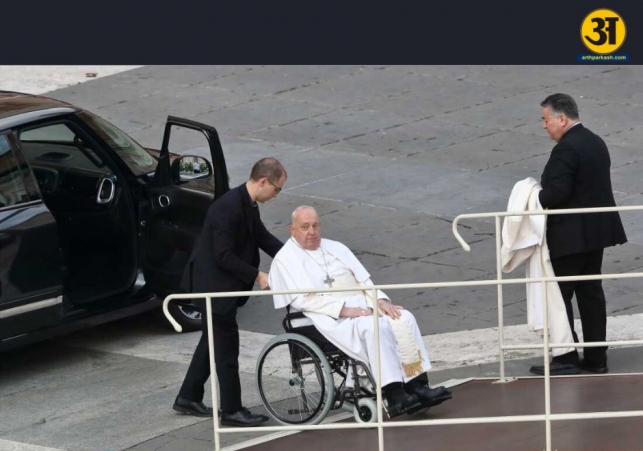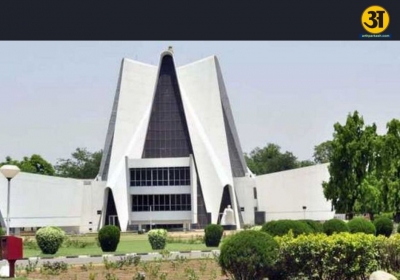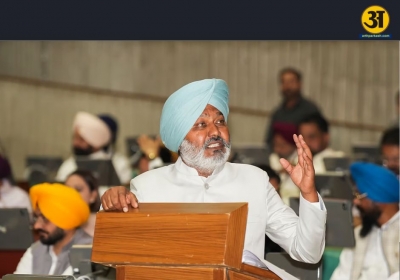
Pope Francis suffers from Polymicrobial Respiratory infection
Pope Francis battling Polymicrobial Respiratory Infection: what it means for his health
Pope Francis, aged 88, has been diagnosed with a polymicrobial respiratory tract infection, which has raised concerns given his age and medical history. Vatican officials disclosed that the Pope's condition requires specific medication, but no further details about the infection's seriousness or treatment have been shared. This infection involves a mix of bacteria, viruses, fungi, or parasites affecting the lungs, and experts believe this condition could become more severe due to the Pope's underlying health issues.
What Is Polymicrobial Respiratory Infection?
Polymicrobial respiratory infections are complex because they involve multiple pathogens that can affect the lungs. Dr. Maor Sauler, an expert in pulmonary medicine from Yale University, explained that these infections often begin as a respiratory issue, such as bronchitis, and can progress to more severe lung complications. For elderly individuals like Pope Francis, the infection poses a greater threat, particularly due to their weakened immune systems and other age-related health challenges.
In simpler terms, polymicrobial means that several microorganisms, such as bacteria, viruses, fungi, or parasites, can be present in the lungs simultaneously. When the immune system is weakened, like in older adults, it becomes more difficult for the body to fight off these multiple infections, making treatment more complicated. The Pope’s case is further complicated by the fact that he had a lung removed due to pneumonia during his youth, leaving him more vulnerable to respiratory issues.
The medical team treating the Pope will have to carefully tailor a treatment plan to address all the different organisms that could be causing his infection. According to Dr. Sauler, it’s essential to treat each pathogen present in the lungs, as some might respond to antibiotics while others may require different medications.
The Pope’s medical history adds to the complexity of his condition. As a young man, he had part of his right lung removed due to severe pneumonia. This pre-existing lung damage makes him more susceptible to infections, as bacteria can more easily invade and colonize the weakened airways. In such cases, it becomes more challenging to treat infections because the compromised lungs are not as effective at clearing out pathogens.
Dr. Nick Hopkinson, the Medical Director at Asthma Lung UK, pointed out that while healthy individuals can recover from bronchitis relatively quickly, Pope Francis’s lung condition requires more care. His damaged lung tissue increases the risk of the infection worsening, which could require additional treatments like oxygen support or chest physiotherapy. These treatments would help clear the fluid that accumulates in the lungs due to the infection.
Despite the concerns surrounding his health, Dr. Hopkinson expressed some optimism. He believes that with the right treatment and close monitoring, Pope Francis should recover. Once doctors identify the pathogens responsible for the infection, they can begin the appropriate treatment to address all the organisms involved. As Dr. Hopkinson noted, it’s "only a matter of time" before the Pope starts to improve.
The recovery process will depend on the severity of the infection and the Pope’s response to treatment. Typically, antibiotics can treat respiratory infections within a few days to two weeks, but the presence of multiple pathogens complicates the treatment plan. In addition to antibiotics, the Pope may be given medications that are commonly used to treat conditions like asthma or chronic obstructive pulmonary disease (COPD). These treatments will help manage the infection and reduce any inflammation in the lungs.
Physiotherapy will also be an important part of the recovery plan, as it can help clear fluids from the lungs and improve overall lung function. Dr. McCarthy, another expert, pointed out that some infections are harder to treat and may take longer to resolve. However, he remains optimistic that with the correct treatment plan, the Pope will recover.
Dr. Peter Openshaw, a lung specialist at Imperial College London, emphasized that the presence of multiple pathogens in a patient’s lungs is not unusual. In fact, it’s common for respiratory infections to involve several microorganisms at once. However, this also makes treatment more difficult, as doctors need to address each pathogen separately.
ALSO READ: Pope undergoes treatment for respiratory infection, continues hospital stay
ALSO READ: US Secretary of State Marco Rubio declares: ‘Hamas must be eradicated’
Concerns about Pneumonia
One of the major concerns for Pope Francis's doctors is the risk of pneumonia. Pneumonia is a leading cause of death, especially in older adults, and it can be much more dangerous when the immune system is weak. Dr. Sauler noted that while antibiotics can treat pneumonia, the immune system’s role in recovery cannot be underestimated. As people age, their immune systems become less efficient, making pneumonia harder to treat.
Given the Pope’s age, pneumonia could be especially concerning. Dr. Sauler pointed out that the risks increase significantly as individuals age, and this makes treating pneumonia in the elderly much more complicated than in younger, healthier individuals. The Pope’s medical team is likely paying close attention to signs of pneumonia and will take extra precautions to prevent it from worsening.
In the coming days, Pope Francis’s doctors will carefully monitor his condition to ensure that the infection does not worsen despite the treatment. Dr. Sauler explained that if the Pope’s health declines despite the efforts of his medical team, it would be a bad sign. However, he remains hopeful that with the right treatment, the Pope will start to recover.
The doctors will likely reassess the Pope’s condition in a few days to determine how well the prescribed medications are working. If the infection starts to resolve, the Pope’s doctors will continue their treatment plan and may begin to taper off some medications. The key to his recovery will be ensuring that all the pathogens in his lungs are treated effectively and that his immune system can support the healing process.
Pope Francis’s condition is a reminder of the complexities of treating respiratory infections in older adults, particularly those with underlying health issues. While the infection itself is concerning, experts remain optimistic that with the right treatment and close monitoring, Pope Francis will make a recovery. His medical team is working diligently to identify the specific pathogens causing the infection and is adjusting his treatment plan accordingly.
As the world watches, the Pope’s doctors will continue to monitor his progress, with a focus on ensuring that his immune system can cope with the infection. In the meantime, his followers around the world hope for his speedy recovery and pray that he will overcome this health challenge.





